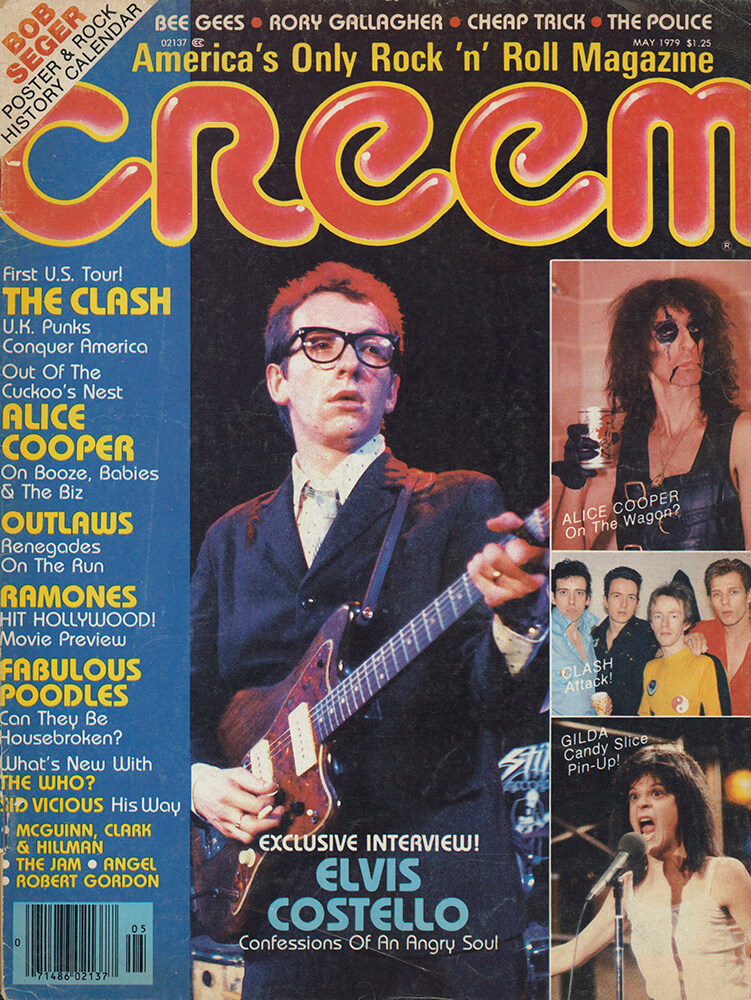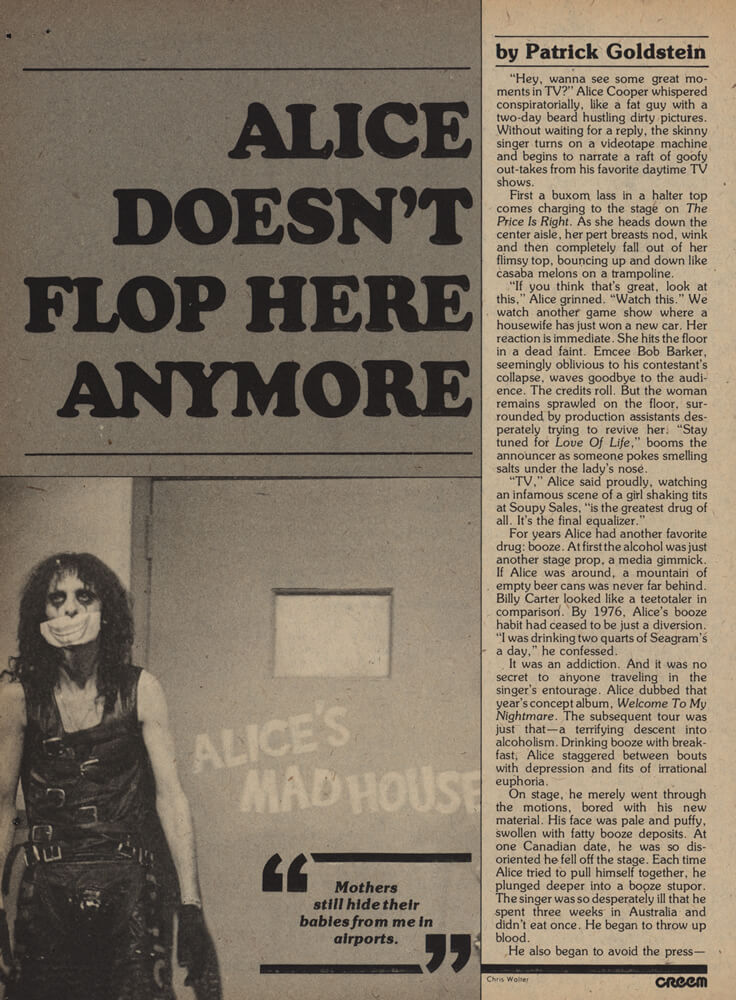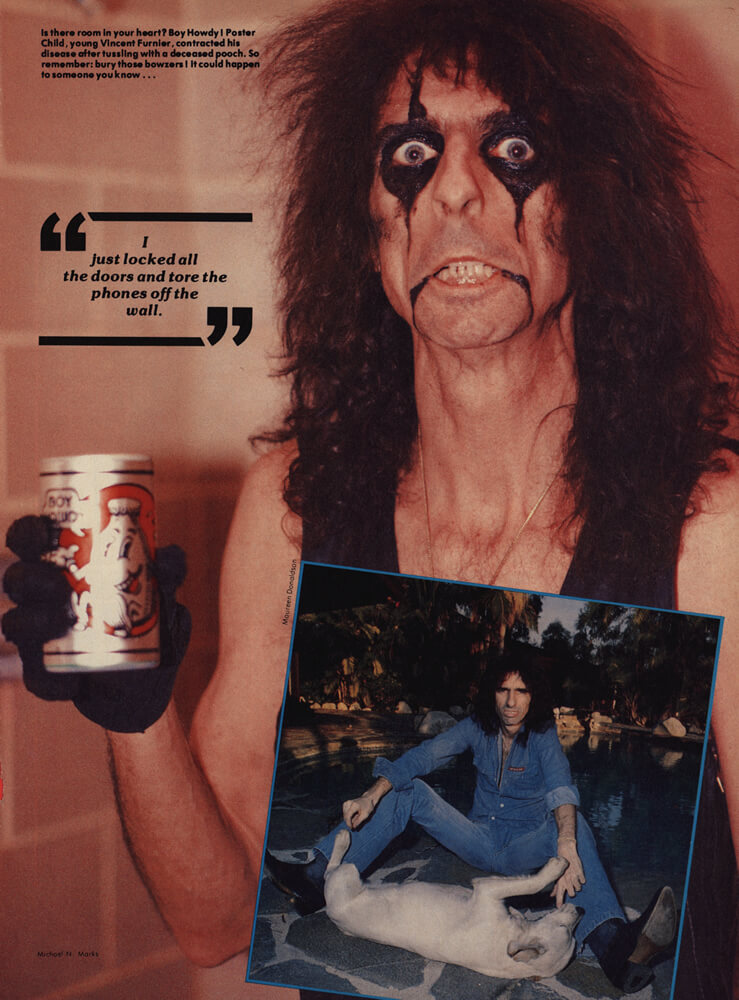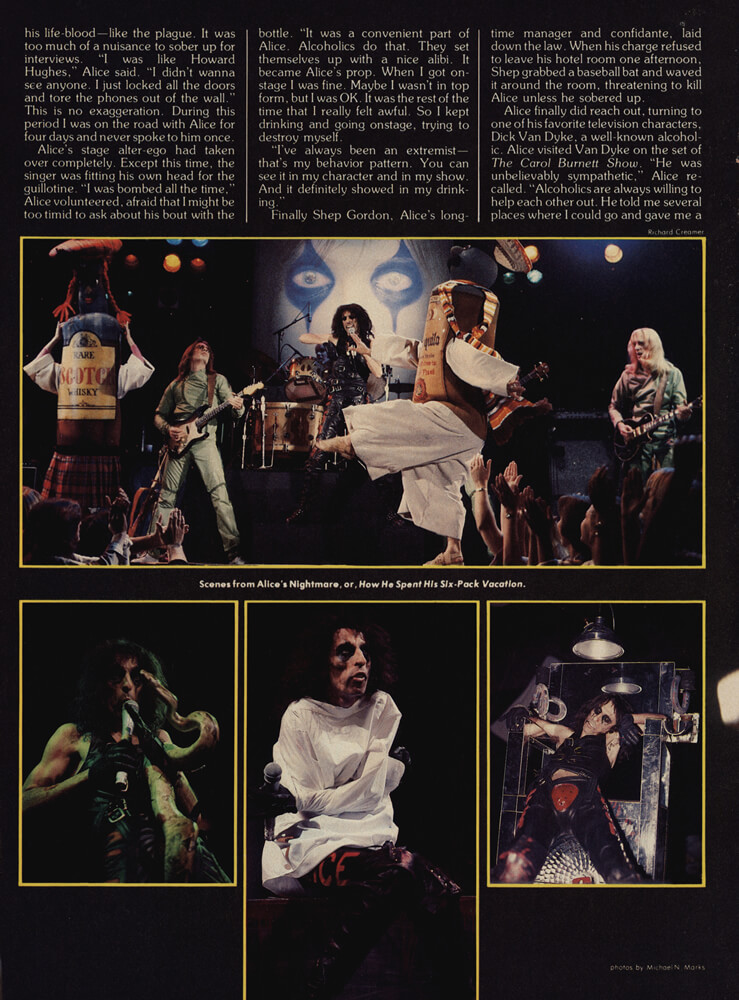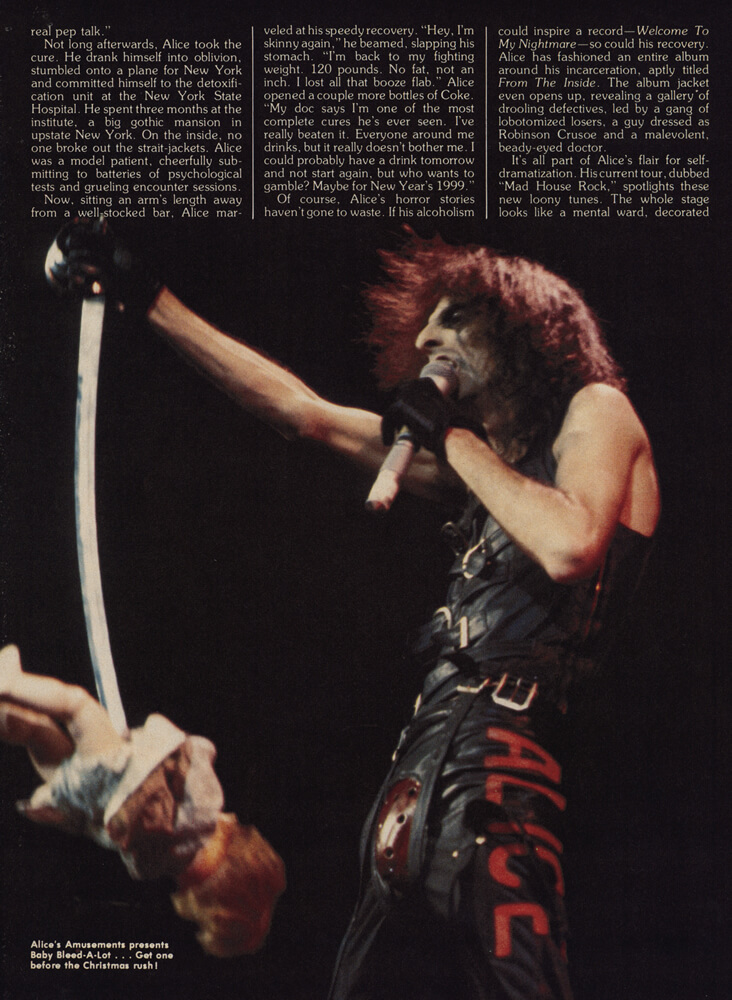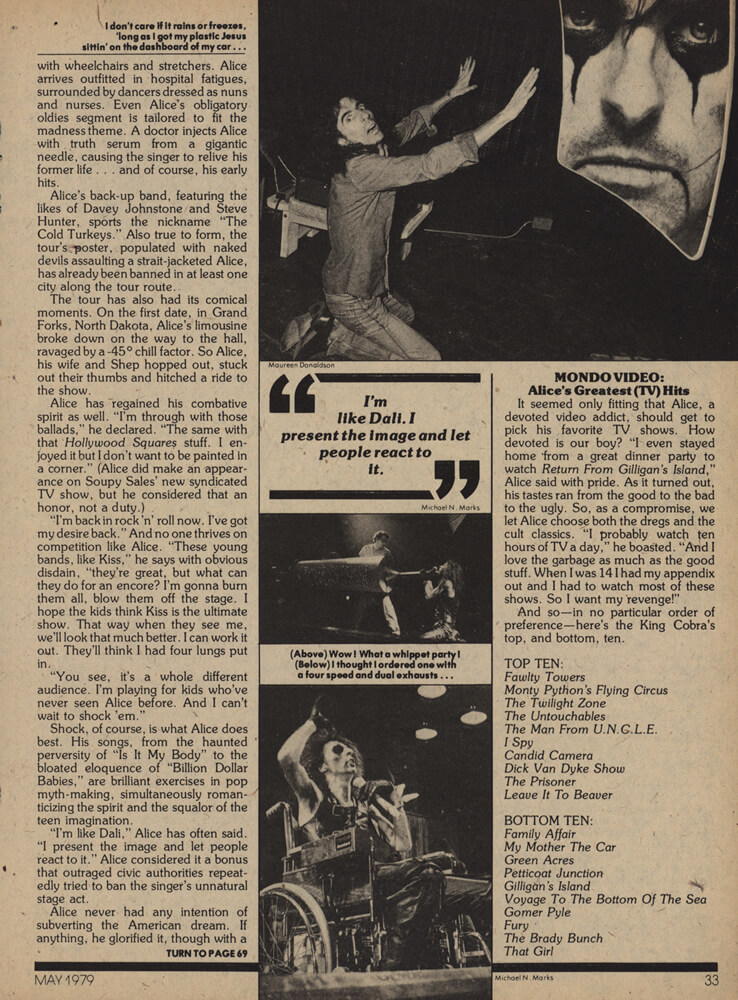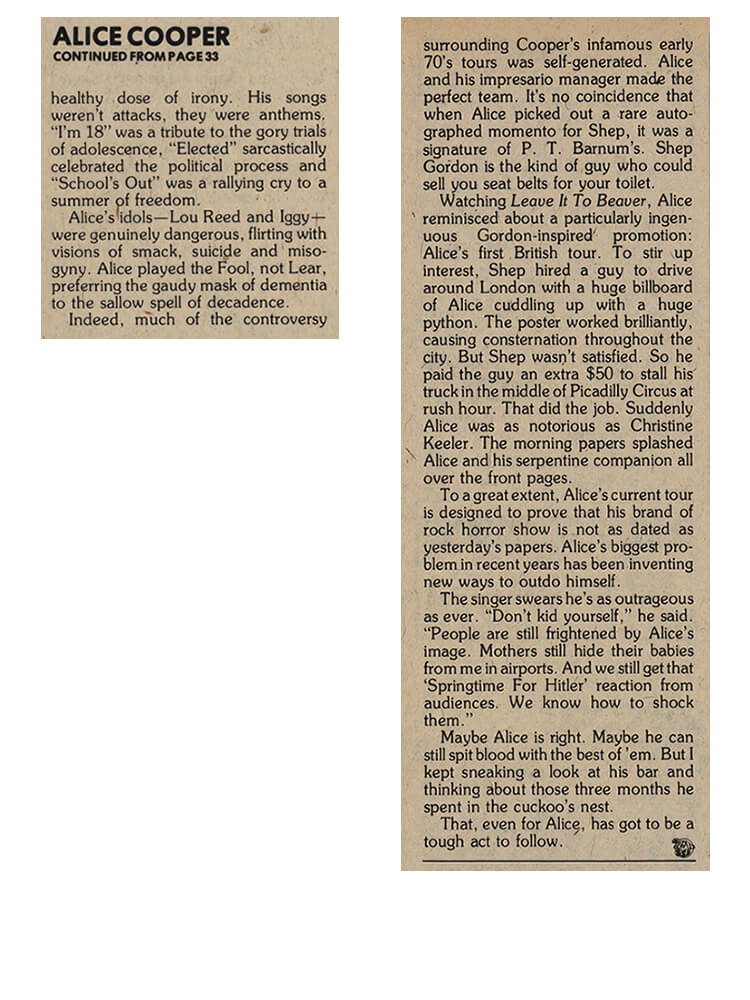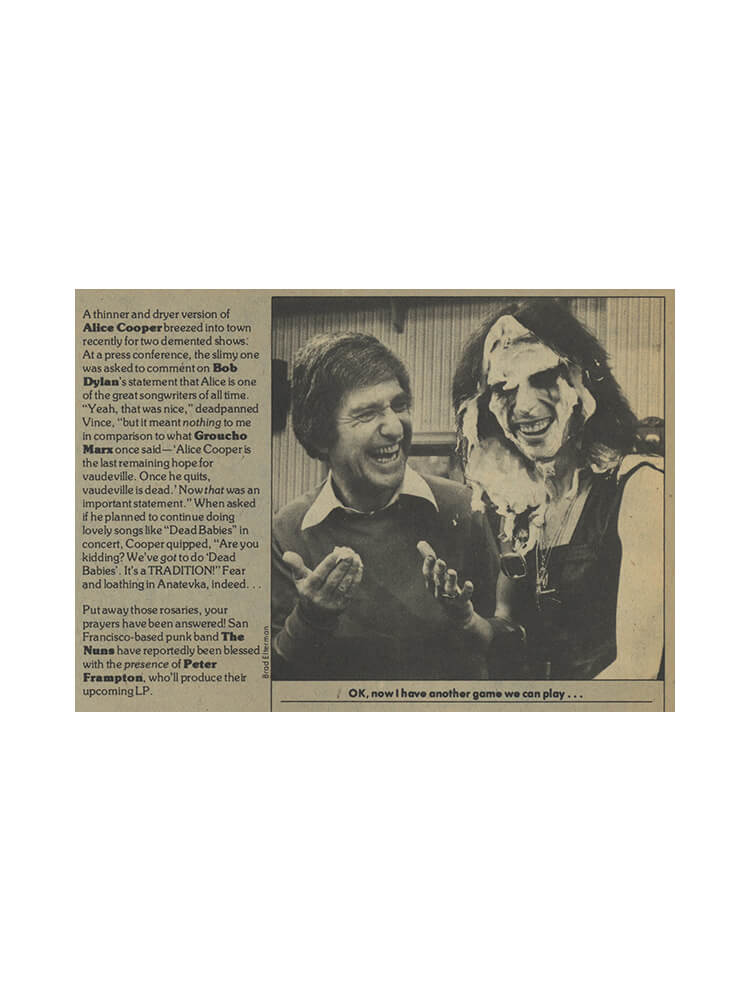Article Database
Alice Doesn't Flop Here Anymore
"Hey, wanna see some great moments in TV?" Alice Cooper whispered conspiratorially, like a fat guy with a two-day beard hustling dirty pictures. Without waiting for a reply, the skinny singer turns on a videotape machine and begins to narrate a raft of goofy out-takes from his favorite daytime TV shows.
First a buxom lass in a halter top comes charging to the stage on The Price Is Right. As she heads down the center aisle, her pert breasts nod, wink and then completely fall out of her flimsy top, bouncing up and down like casaba melons on a trampoline.
"If you think that's great, look at this," Alice grinned. "Watch this." We watch another game show where a housewife has just won a new car. Her reaction is immediate. She hits the floor in a dead faint. Emcee Bob Barker, seemingly oblivious to his contestant's collapse, waves goodbye to the audience. The credits roll. But the woman remains sprawled on the floor, surrounded by production assistants desperately trying to revive her. "Stay tuned for Love Of Life," booms the announcer as someone pokes smelling salts under the lady's nose.
"TV," Alice said proudly, watching an infamous scene of a girl shaking her tits at Soupy Sales, "is the greatest drug of all. It's the final equalizer."
For years Alice has had another favorite drug: booze. At first the alcohol was just another prop, a media gimmick. If Alice was around, a mountain of empty beer cans was never far behind. Billy Carter looked like a teetotaler in comparison. By 1976, Alice's booze habit had ceased to be just a diversion. "I was drinking two quarts of Seagram's a day," he confessed.
It was an addiction. And it was no secret to anyone traveling with the singer's entourage. Alice dubbed that year's concept album, Welcome To My Nightmare. The subsequent tour was just that - a terrifying descent into alcoholism. Drinking booze with breakfast, Alice staggered between bouts with depression and fits of irrational euphoria.
On stage, he merely went through the motions, bored with his new material. His face was pale and puffy, swollen with fatty booze deposits. At one Canadian date, he was so disoriented he fell off the stage. Each time Alice tried to pull himself together, he plunged deeper into a booze stupor. The singer was so desperately ill that he spent three weeks in Australia and didn't eat once. He began to throw up blood.
He also began to avoid the press — his life blood — like the plague. It was too much of a nuisance to sober up for interviews. "I was like Howard Hughes," Alice said. "I didn't want to see anyone. I just locked all the doors and tore the phones off the wall." This is no exaggeration. During this period I was on the road with Alice for four days and never spoke to him once.
Alice's stage alter-ego had taken over completely. Except this time, the singer was fitting his own head for the guillotine. "I was bombed all the time," Alice volunteered, afraid that I might be too timid to ask about his bout with the bottle. "It was a convenient part of Alice. Alcoholics do that. They set themselves up with a nice alibi. I became Alice's prop. When I got onstage I was fine. Maybe I wasn't in top form, but I was OK. It was the rest of the time that I felt awful. So I kept drinking and going onstage, trying to destroy myself.
"I've always been an extremist — that's my behavior pattern. You can see it in my character and in my show. And it definitely showed in my drinking."
Finally Shep Gordon, Alice's longtime manager and confidante, laid down the law. When his charge refused to leave his hotel room one afternoon, Shep grabbed a baseball bat and waved it around the room, threatening to kill Alice unless he sobered up.
Alice finally did reach out, turning to one of his favorite television characters, Dick Van Dyke, a well-known alcoholic. Alice visited Van Dyke on the set of The Carol Bennett Show. "He was unbelievably sympathetic," Alice recalled. "Alcoholics are always willing to help each other out. He told me several places where I could go and gave me a real pep talk."
Not long afterwards, Alice took the cure. He drank himself into oblivion, stumbled onto a plane for New York and committed himself to the detoxification unit at the New York State Hospital. He spent three months at the institute, a big gothic mansion in upstate New York. On the inside, no one broke out the straight-jackets. Alice was a model patient, cheerfully submitting to batteries of psychological tests and grueling encounter sessions.
Now, sitting an arm's length away from a well-stocked bar, Alice marveled at his speedy recovery. "Hey, I'm skinny again," he beamed, slapping his stomach. "I'm back to my fighting weight. 120 pounds. No fat, not an inch. I lost all that booze flab." Alice opened a couple more bottles of Coke. "My doc says I'm one of the most complete cures he's ever seen. I've really beaten it. Everyone around me drinks, but it really doesn't bother me. I could probably have a drink tomorrow and not start again, but who wants to gamble? Maybe for New Year's 1999."
Of course, Alice's horror stories haven't gone to waste. If his alcoholism could inspire a record — Welcome To My Nightmare — so could his recovery. Alice has fashioned an entire album around his incarceration, aptly titled From The Inside. The album jacket even opens up, revealing a gallery of drooling defectives, led by a gang of lobotomized losers, a guy dressed as Robinson Crusoe and a malevolent beady-eyed doctor.
It's all part of Alice's flair for self-dramatization. His current tour, dubbed "Mad House Rock," spotlights these new loony tunes. The whole stage looks like a mental ward, decorated with wheelchairs and stretchers. Alice arrives outfitted in hospital fatigues, surrounded by dancers dressed as nuns and nurses. Even Alice's obligatory oldies segment is tailored to fit the madness theme. A doctor injects Alice with truth serum from a gigantic needle, causing the singer to relive his former life... and of course, his early hits.
Alice's back-up band, featuring the likes of Davey Johnstone and Steve Hunter, sports the nickname "The Cold Turkeys." Also true to form, the tour's poster, populated with naked devils assaulting a strait-jacketed Alice, has already been banned in at least one city along the tour route.
The tour has also had its comical moments. On the first date, in Grand Forks, North Dakota, Alice's limousine broke down on the way to the hall, ravaged by a -45 degrees chill factor. So Alice, his wife and Shep hopped out, stuck out their thumbs and hitched a ride to the show.
Alice has regained his combative spirit as well. "I'm through with those ballads," he declared. "The same with that Hollywood Squares stuff. I enjoyed it but I don't want to be painted in a corner." (Alice did make an appearance on Soupy Sales' new syndicated TV show, but he considered that an honor, not a duty.)
"I'm back in rock 'n' roll now. I've got my desire back." And no one thrives on competition like Alice. "These young bands like Kiss," he says with obvious disdain, "they're great, but what can they do for an encore? I'm gonna burn them all, blow them off the stage. I hope the kids think Kiss is the ultimate show. That way when they see me, we'll look that much better. I can work it out. They'll think I had four lungs put in.
"You see, it's a whole different audience. I'm playing to kids who've never seen Alice before. And I can't wait to shock 'em."
Shock, of course, is what Alice does best. His songs, from the haunted perversity of "Is It My Body" to the bloated eloquence of "Billion Dollar Babies," are brilliant exercises in pop myth-making, simultaneously romanticizing the spirit and the squalor of the teen imagination.
"I'm like Dali," Alice has often said. "I present the image and let people react to it." Alice considered it a bonus that outraged civic authorities repeatedly tried to ban the singer's unnatural stage act.
Alice never had any intention of subverting the American dream. If anything, he glorified it, though with a healthy dose of irony. His songs weren't attacks, they were anthems. "I'm 18" was a tribute to the glory trials of adolescence, "Elected" sarcastically celebrated the political process and "School's Out" was a rallying cry to a summer of freedom.
Alice's idols — Lou Reed and Iggy — were genuinely dangerous, flirting with visions of smack, suicide and misogyny. Alice played the Fool, not Lear, preferring the gaudy mask of dementia to the sallow spell of decadence.
Indeed, much of the controversy surrounding Cooper's infamous early 70's tours self-generated. Alice and his impresario manager made the perfect team. It's no coincidence that when Alice picked out a rare autographed momento for Shep, it was a signature of P. T. Barnum's. Shep Gordon is the kind of guy who could sell you seat belts for your toilet.
Watching Leave It To Beaver, Alice reminisced about a particularly ingenuous Gordon-inspired promotion: Alice's first British tour. To stir up interest, Shep hired a guy to drive around London with a huge billboard of Alice cuddling up with a huge python. The poster worked brilliantly, causing consternation throughout the city. But Shep wasn't satisfied. So he paid the guy an extra $50 to stall his truck in the middle of Piccadilly Circus at rush hour. That did the job. Suddenly Alice was as notorious as Christine Keeler. The morning papers splashed Alice and his serpentine companion all over the front pages.
To a great extent, Alice's current tour is designed to prove that his brand of rock horror show is not as dated as yesterday's papers. Alice's biggest problem in recent years has been inventing new ways to outdo himself.
The singer swears he's as outrageous as ever. "Don't kid yourself," he said. "People are still frightened by Alice's image. Mothers still hide their babies from me in airports. And we still get that 'Springtime For Hitler' reaction from audiences. We know how to shock them."
Maybe Alice is right. Maybe he can still spit blood with the best of 'em. But I kept sneaking a look at his bar and thinking about those three months he spent in the cuckoo's nest.
That, even for Alice, has got to be a tough act to follow.
A thinner and dryer version of Alice Cooper breezed into town recently for two demented shows. At a press conference, the slimy one was asked to comment on Bob Dylan's statement that Alice is one of the great songwriters of all time. "Yeah, that was nice," deadpanned Vince, "but it meant nothing to me in comparison to what Groucho Marx once said — 'Alice Cooper is the last remaining hope for vaudeville. Once he quits, vaudeville is dead.' Now that was an important statement." When asked if he planned to continue doing lovely songs like "Dead Babies" in concert, Cooper quipped, "Are you kidding? We've got to do 'Dead Babies'. It's a TRADITION!" Fear and loathing in Anatevka, indeed...



